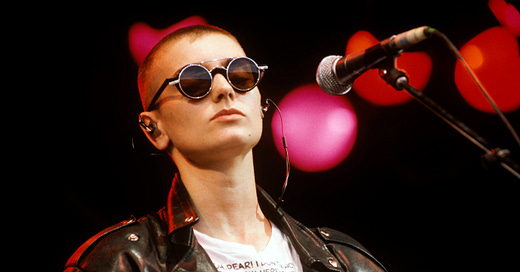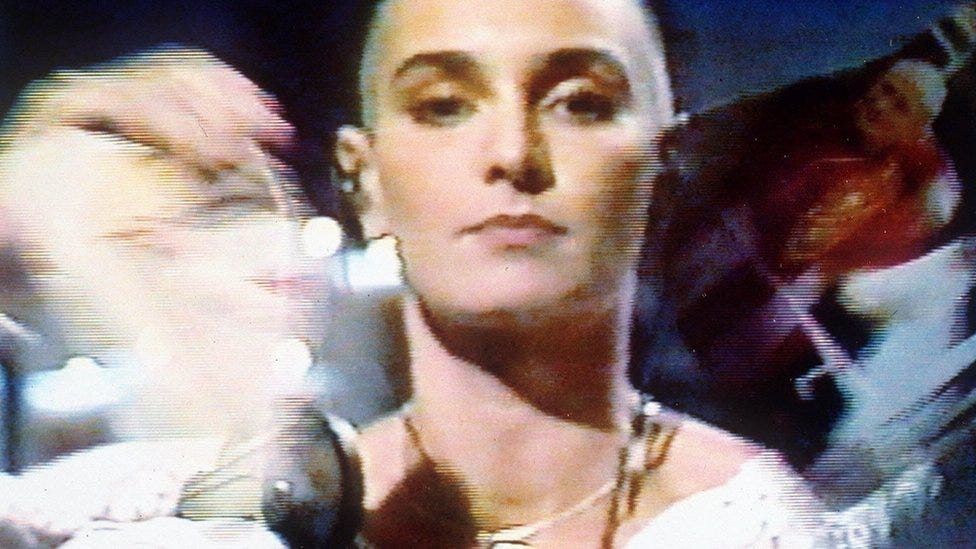I am warning you now that this post will swing wildly from a personal attempt to take over the front page of The New Yorker, to an earnest love letter, to a threat.
But before our regularly scheduled programming, two notes!
One: we’ve hit 100 subscribers! I am drunk with power and ambition, and would like for there to be another zero at the end of that number one day, so tell your friends. (You don’t know how happy I am to have you here, so thank you.)
Two: occasional contributions will begin next week! As always, your pop culture analysis, notes app apologies, recipes, or unfortunate stories are welcomed.
In 1992, when she was just my age (twenty-five, and not a day older, thanks), Sinéad O’Connor performed for a Bob Dylan benefit concert at Madison Square Garden.
Well, she tried. The crowd was so rowdy and hostile that she couldn’t sing. She waved off the pianist plunking out the first notes of “I Believe in You” and just stood in silence, chin up, while 18,000 people jeered and booed at the stage.
Finally, she sang a couple verses of Bob Marley’s “War” a capella, her singular voice defiant and determined. Then she rushed offstage to gag.
(This is the New Yorker section, if you couldn’t tell.)
But why the hostility, you ask?
Two weeks earlier, performing live on SNL to promote that very same benefit concert, she sang Bob Marley’s “War” and, with the words “Fight the real enemy,” ripped a photo of Pope John Paul II in half.
The “real enemy” being, of course, the institution of the Catholic Church, which has a history of tens of thousands of child abuse cases all over the world, often hidden or dismissed. Pope Benedict XVI himself wrote a letter in 2001 instructing bishops not to disclose abuse claims to police and to keep evidence secret for as long as 10 years.
Sinéad herself had suffered abuse at the hands of the Church. And for the very serious moral transgression of protesting live on television, 10 years before the Boston Globe investigation that brought the issue of child abuse in the Church to global attention, Sinéad was lambasted and boycotted, mocked in headlines. Joe Pesci, who hosted the show the next week, said that if he were there while she did the ignominious deed, “[he] would have given her such a smack.” And, of course, there was the crowd reaction at Madison Square Garden.
It’s fascinating how ripping up a picture of a man (holy or not) is more of a moral outrage than the real and rampant abuse cases perpetuated by the very institution that man represents.
But what do I know, I’m just a sinful daughter of Eve. Am I right, ladies??
Sinéad has always been controversial, contrary. Her signature buzzcut began as a refusal to be sexualized. Her 1990 album I Do Not Want What I Haven’t Got won Best Alternative Music Performance at the Grammys, and she refused to attend the event or accept the award. On the same album, “Black Boys on Mopeds” addressed the systemic racism rampant in Great Britain, specifically the 1983 death of Colin Roach in police custody. After being ordained in the 90s as a priest by the Irish Orthodox Catholic and Apostolic Church (an independent entity; Roman Catholic doctrine forbids women from the priesthood), she converted to Islam in 2018.
I am comfortable and even happy being alone in my obsessions. I don’t know anyone else who watches Sims 4 Youtube videos every day, for example, or who took a medieval history class in college for fun.1 None of my friends really listen to Sinéad, or know anything about her, except for the SNL debacle and perhaps her haircut.
But at her core, beyond any career controversy or struggle, Sinéad is a mesmerizing singer, in turns sharp and guttural, velvety and sweet, her soul carried in her eyes. “Nothing Compares 2 U,” the song and video that propelled her to stardom, made Sinéad the first female artist to win MTV’s Video of the Year award, in 1990. If anyone today—and I do truly mean anyone—tried to emulate that authenticity, it would be as shallow, plastic, and flavorless as a red cup full of Bud Light.
“Troy” is a tour de force, “Drink Before the War” melancholy, “Night Nurse” funky, “Three Babies” soft, “Jackie” otherworldly.
But that performance at Madison Square Garden. I come back to it more than the music I listen to on repeat. Her silent composure in the face of derision and hatred, her steadfast belief in herself, even her breakdown off-stage.
When I watch it, I remember not to be so afraid.
If she can face down an unruly crowd of 18,000, I can kill that spider in my bedroom.
Writing my final paper on Dante’s Inferno was not fun, but reading the coroner’s reports was. RIP @DeathMedieval, which got suspended on Twitter for harassment because of its auto-replies to followers: You fell into a ditch and died. You got murdered by a clerk. You died by misadventure.





